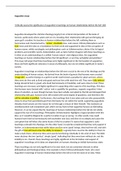Augustine essay
‘Critically assess the significance of augustine’s teachings on human relationships before the fall’ (40)
Augustine developed his christian theology largely from a literal interpretation of the book of
Genesis, particularly where adam and eve sin, breaking their relationship with god and bringing sin
upon god’s creation. He teaches on human relationships before the fall, outlining them as
harmonious and characterised by ‘caritas’, charitable love, and reason. Ethical philosophers such as
Kant have used this idea as a foundation for their work and supported its idea of the corruption of
human reason, whilst sociologists and philosophers such as Schleiermacher crticise it for its logical
problems and scientific naivity. Existentialists such as Satre further disagree with these teachings as
it relies on an understanding of a unified ‘human nature’ and religious ideas. Are augustines
teachings on human relationships before the fall significant, or are they unhelpful and pointless?
This essay will argue that these teachings were highly significant in the formulation of augustines
ideas and hold significant relevance in areas of philosophy, but are not widely significant in today’s
society.
Augustine’s teachings on relationships before the fall were crucial to the rest of his theology and his
understanding of human nature. He derived from the book of genesis that humans were created
‘imago dei’, as perfect beings in a perfect world. God formed a paradise for adam and eve, where
they were sin-free and so lived only good and true lives with total free will. They were fully rational
beings devoid of lust or greed, who lived harmoniously in friendship, and were close to God. These
teachings are necessary and highly significant in supporting other aspects of his teachings. This idea
that humans were formed with ‘caritas’ and a capability for goodness, supports augustine’s later
ideas of salvation, as even though humans have been wholly corrupted by the fall and damaged their
relationship with god, humans were still created with some degree of goodness, and therefore the
call for salvation is justified. Furthermore, the teachings that it was adam and eve who purposefully
chose to stray from god shields god from the blame for sin within the world, supporting augustines
theodicy that humans are the reason for evil through a misuse of their freewill. This maintains an
omnibenevolent and omnipotent god, which are key factors that augustine focuses on defending.
However, it can be argued that his teachings of human relationships before the fall do not wholly
support the rest of his teachings. Philosopher Schleiermacher highlights a logical problem with this
idea, as it ‘would be illogical for a perfect creation to go so wrong’. In other words, how could
humans have lived so harmoniously with eachother and God, and then sin so deeply and cause the
corruption that will infect the entire future of the his creation? It seems that augustine’s early
teachings contradict his theology. On the other hand, it could be considered that they only support it
further, as it demonstrates that whilst Adam and Eve were ‘good’ beings, they had free will, and with
the gift of free will must come the ability to misuse it. Logically there must be the ability for them to
make a bad choice, otherwise they were purely functioning robotically in the wish of God. The bible
never declares the two ‘perfect’, simply ‘good’, indicating that they were born without sin, not the
inability to sin. Overall, these teachings are highly significant in the formation and support of
augustine’s teachings as his ideas are dependent on humans showing an intitial harmonious state.
These teachings are not only significant to his own work, but are extremely relevant to other
philisophical and theological ideas. One example is that of ethical philosopher Kant, who used
Augustine’s teachings of human relationships before the fall to form the basis of an idea. What




